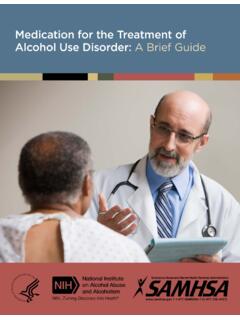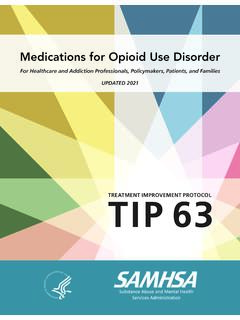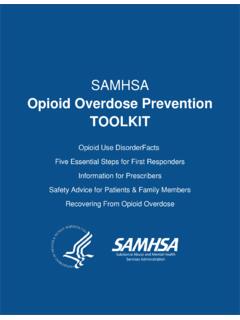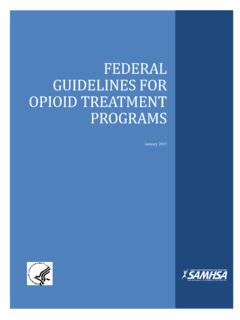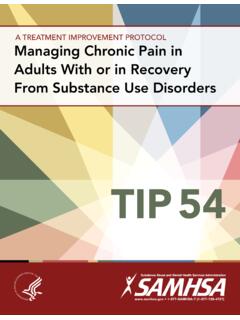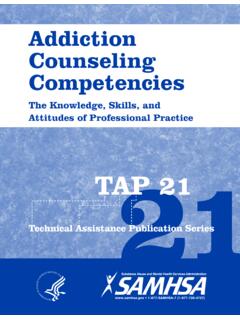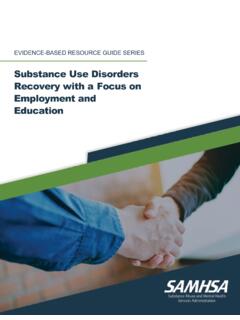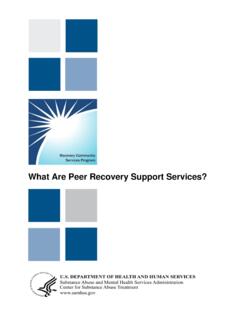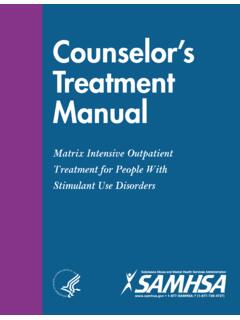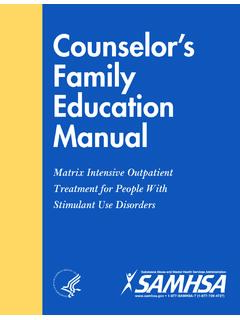Transcription of UNDERSTANDING ANXIETY DISORDERS - Substance Abuse …
1 1 UNDERSTANDING ANXIETY DISORDERS Young Adult: Get the FactsWhat does it mean when a health care professional says ANXIETY disorder ? ANXIETY DisordersHearing the health care professional say you have an ANXIETY disorder can be confusing. The good news is that the feelings and stress-related behaviors you have been concerned about are actually symptoms of a treatable disorder. By getting treatment and engaging in recovery, people with an ANXIETY disorder can manage their symptoms, feel better, and lead productive and meaningful lives.
2 Recovery does not necessarily mean a cure. It does mean that people are actively moving toward wellness. It is important to talk with a health care provider about treatment options and additional information. Your provider may be a child and adolescent psychiatrist, general psychiatrist, psychologist, pediatrician, social worker, or other health care provider. If you are concerned that you may have an ANXIETY disorder, it is important to seek a thorough evaluation. The evaluation includes talking about your symptoms, blood and urine tests, and perhaps other tests to ensure that there is no underlying medical condition that could be causing the symptoms.
3 It is also important to ensure that you can tolerate medication, if recommended as part of the treatment plan. What do we mean by recovery?Recovery is a process of change through which individuals improve their health and wellness, live a self-directed life, and strive to reach their full focuses on wellness and resilience, encouraging [people] to participate actively in their own I finally received a diagnosis, I knew there was a name for what I was experiencing and there was something I could do about it.
4 Youth 2y What is an ANXIETY disorder?People with ANXIETY DISORDERS worry excessively. The feelings go well beyond the typical kind of worr that is appropriate to situations and can help people to focus and be alert. The apprehensive feelings that are typical of an ANXIETY disorder are felt almost every day, and may be overwhelming and difficult to manage. With an ANXIETY disorder, you may feel restless, your heart pound, experience muscle tension, fatigue, irritability, difficulty concentrating, and/or sleep disturbances.
5 These symptoms can be severe enough to interfere with day-to-day activities in school, at work, or in social situations. There are 3 types of ANXIETY DISORDERS : generalized ANXIETY disorder (GAD), phobias, and panic DISORDERS . Some people have milder forms of ANXIETY DISORDERS that don t last forever and respond well to treatment. Others with more severe forms of an ANXIETY disorder may experience symptoms over their lifetime with the specific type of ANXIETY changing over time or including mood changes. However, treatments for an ANXIETY disorder that involve medications, psychotherapy, and other elements of an individualized treatment program can help you to be more resilient, manage your symptoms, improve everyday functioning, and help you to lead a full, meaningful life.
6 An individualized treatment program can include positive family and peer caused this? Researchers and health care professionals do not completely understand what causes ANXIETY DISORDERS . It is unlikely that a single factor causes an ANXIETY disorder. It is most likely caused by a combination of things such as genetics ( family history of ANXIETY DISORDERS ), chemical or other changes in the brain, and/or environmental factors. Traumatic experiences can also add to the development of mental health DISORDERS .
7 If you have experienced a traumatic incident, it is important to share that information with your mental health specialist and common is this disorder? ANXIETY DISORDERS represent one of the most common forms of mental DISORDERS among children and adolescents, but they often go undetected or untreated. Data from the Centers for Disease Control and Prevention show that the rate of ANXIETY DISORDERS among 3-17-year-olds is in the range of 3 percent (current symptoms) to percent (ever reported having ANXIETY ).
8 4 What do we mean by resilience?Resilience is the ability to respond to stress, ANXIETY , trauma, crisis, or disaster. It is critical in recovery [from mental DISORDERS ].33 What are the treatment approaches?An ANXIETY disorder can be managed in many ways. This includes with the use of psychotherapy or a combination of prescribed medication and therapy. You should consider various treatment options, along with your family and your health care provider. Collaborative decisions should be made based on your own priorities and goals.
9 If you are of consenting age, you may need to provide written consent for parents or caregivers to participate on the treatment team. It is important to talk to your health care providers about other types of treatment, such as complementary medicine, as well as programs that can provide additional support related to education, employment, housing, and vocation and career development. It is also important to have good self-care, such as a healthy diet, exercise, sleep, and abstinence from illicit drugs. UNDERSTANDING your treatment will help you play an active, full role in your (particularly a group of medications called Selective Serotonin Reuptake Inhibitors or SSRIs) can help manage many of the symptoms of an ANXIETY disorder.
10 Each person reacts differently to these medications. For that reason, the prescribing health care professional may try different doses and different kinds of medication before finding the most effective approach for you. Finding the best medication and the most effective dose for you may take time. In milder cases of an ANXIETY disorder, medication may not be necessary, and therapy or lifestyle changes ( , smoking cessation, decreased caffeine intake, regular exercise, or mindfulness exercises) may be sufficient to manage therapy, cognitive behavioral therapy, or other forms of psychotherapy may be used alone or in combination with medications depending on severity of symptoms.
